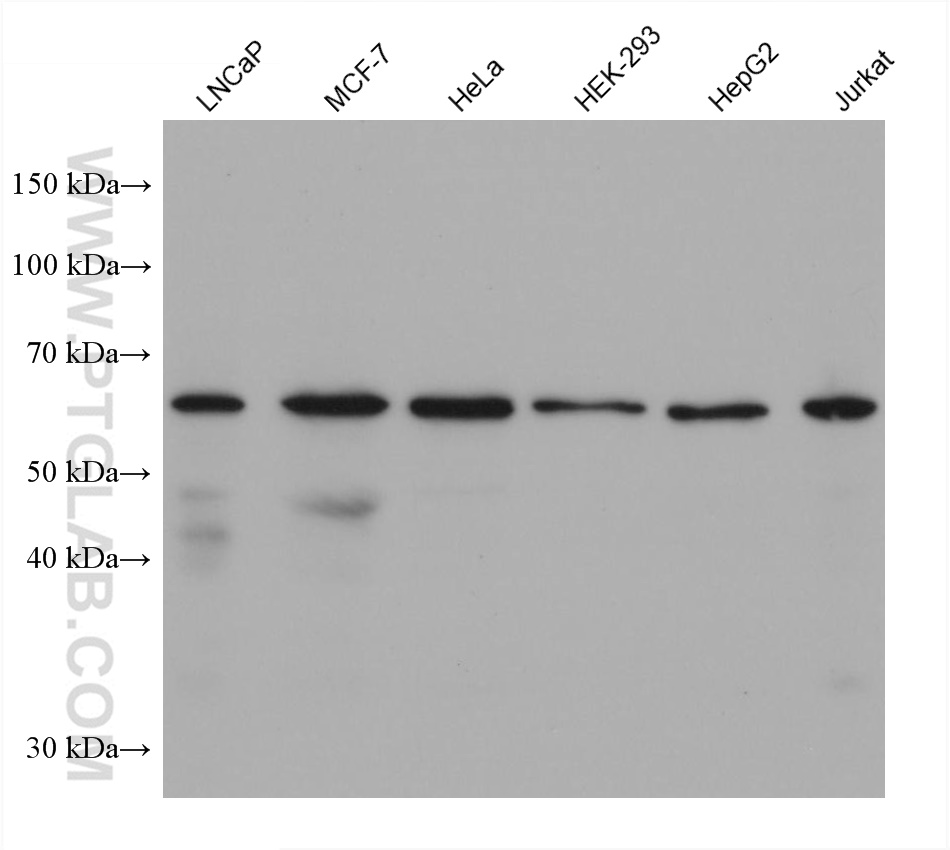验证数据展示
经过测试的应用
| Positive WB detected in | LNCaP cells, MCF-7 cells, HeLa cells, HEK-293 cells, HepG2 cells, Jurkat cells |
推荐稀释比
| 应用 | 推荐稀释比 |
|---|---|
| Western Blot (WB) | WB : 1:5000-1:50000 |
| It is recommended that this reagent should be titrated in each testing system to obtain optimal results. | |
| Sample-dependent, Check data in validation data gallery. | |
产品信息
68877-1-Ig targets ADCK4 in WB, ELISA applications and shows reactivity with human samples.
| 经测试应用 | WB, ELISA Application Description |
| 经测试反应性 | human |
| 免疫原 |
CatNo: Ag13188 Product name: Recombinant human ADCK4 protein Source: e coli.-derived, PET28a Tag: 6*His Domain: 195-544 aa of BC013114 Sequence: LEEELGRDWQAKVASLEEVPFAAASIGQVHQGLLRDGTEVAVKIQYPGIAQSIQSDVQNLLAVLKMSAALPAGLFAEQSLQALQQELAWECDYRREAACAQNFRQLLANDPFFRVPAVVKELCTTRVLGMELAGGVPLDQCQGLSQDLRNQICFQLLTLCLRELFEFRFMQTDPNWANFLYDASSHQVTLLDFGASREFGTEFTDHYIEVVKAAADGDRDCVLQKSRDLKFLTGFETKAFSDAHVEAVMILGEPFATQGPYDFGSGETARRIQDLIPVLLRHRLCPPPEETYALHRKLAGAFLACAHLRAHIACRDLFQDTYHRYWASRQPDAATAGSLPTKGDSWVDPS 种属同源性预测 |
| 宿主/亚型 | Mouse / IgG1 |
| 抗体类别 | Monoclonal |
| 产品类型 | Antibody |
| 全称 | aarF domain containing kinase 4 |
| 别名 | EC:2.7.-.-, COQ8B, Coenzyme Q protein 8B, Atypical kinase COQ8B, mitochondrial, AarF domain-containing protein kinase 4 |
| 计算分子量 | 544 aa, 60 kDa |
| 观测分子量 | 60 kDa |
| GenBank蛋白编号 | BC013114 |
| 基因名称 | ADCK4 |
| Gene ID (NCBI) | 79934 |
| RRID | AB_3670444 |
| 偶联类型 | Unconjugated |
| 形式 | Liquid |
| 纯化方式 | Protein G purification |
| UNIPROT ID | Q96D53 |
| 储存缓冲液 | PBS with 0.02% sodium azide and 50% glycerol, pH 7.3. |
| 储存条件 | Store at -20°C. Stable for one year after shipment. Aliquoting is unnecessary for -20oC storage. |
背景介绍
ADCK4 (AarF domain-containing protein kinase 4), also known as COQ8B (Coenzyme Q protein 8B), is an atypical kinase involved in the biosynthesis of coenzyme Q, which is also named ubiquinone, an essential lipid-soluble electron transporter for aerobic cellular respiration (PMID: 24270420). Its substrate specificity is unclear: does not show any protein kinase activity. It probably acts as a small molecule kinase, possibly a lipid kinase that phosphorylates a prenyl lipid in the ubiquinone biosynthesis pathway (PMID: 24270420).
实验方案
| Product Specific Protocols | |
|---|---|
| WB protocol for ADCK4 antibody 68877-1-Ig | Download protocol |
| Standard Protocols | |
|---|---|
| Click here to view our Standard Protocols |


